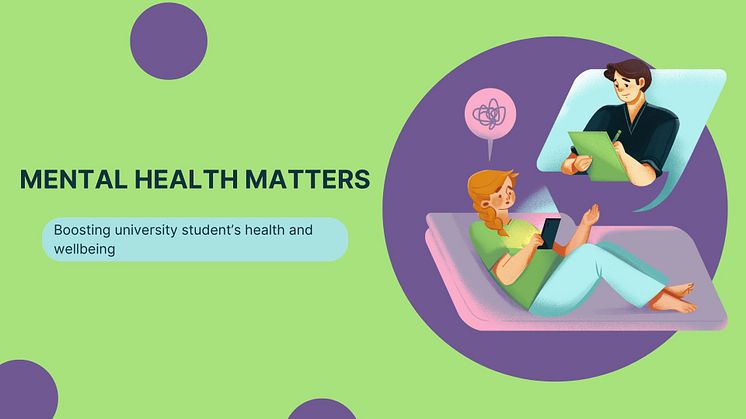
Press release -
Mental health matters: Prioritising wellbeing in university students
University students are likely to experience mental health issues. What are the warning signs? And how can healthy eating, exercise and financial savvy play a role in protecting mental health?
28 June 2024, Johannesburg: Discovery Health Medical Scheme claims data show a 120% increase in the prevalence of mental health conditions among young people (ages 18-24) from 2012 to 2022, compared to an average increase of 44% in older age groups.
The transition from school to tertiary learning institutions can be a high-risk period for the development of significant mental health problems. Students starting out are often away from their families, must make new friends, and bear more responsibility such as financing their studies or managing an allowance, and juggling their schedules and lifestyle. They also have to adjust to a new learning environment and academic requirements.
“If young adults don’t have a strong support system and coping skills during this transition, it can lead to mental disorders,” says Dr Noluthando Nematswerani, Chief Clinical Officer for Discovery Health.
Globally, an average of around 21% of university students have major depressive disorder, according to a World Health Organisation study. In South Africa, the South African Depression and Anxiety Group (SADAG) reports that one in four university students have a mental health condition.
What feeds the risk of mental illness in young adults?
“The pressures of university life and studies can cause latent mental health conditions to emerge or worsen existing mental health conditions,” says Dr Nematswerani.
“Loneliness or homesickness, financial issues, academic strain, adjusting socially, and lack of support are just some of these pressures. Today, young adults also face pressures related to social media and having to always be online. And, problems such as loadshedding, unreliable water supply, and poverty can also impact mental health.”
“According to SADAG, many students don’t open up about their mental health struggles until there is a crisis or an intervention is needed. The organisation regularly receives calls from university students experiencing significant mental distress.”
“Many young adults are unprepared for the transition to university and may be expected to cope with the change even if they are overwhelmed and experiencing anxiety and feelings of depression.”
- WATCH: Dr Nematswerani and Cassey Chambers, Operations Director at SADAG, share tips for protecting mental health in university students -
Signs of depression and anxiety
“While it is normal to experience sadness, low moods or anxiety at times, it becomes a concern if these feelings persist for more than two weeks. If a student, their parents or friends notice any of these warning signs, they should get help.”
- WATCH: Dr Nematswerani and Cassey Chambers unpack common mental health conditions in university students.
Look out for these symptoms of depression:
- Depressed mood, feeling down and sad all the time.
- Hopelessness
- Agitation, irritability and even aggression
- Change in sleeping patterns such as not being able to sleep or sleeping too much.
- Fatigue, lack of energy and motivation
- Change in eating habits
- Difficulty concentrating
- Withdrawing from friends and loved ones
- Missing lectures
- Physical symptoms can include digestive problems or frequent headaches
- The use of drugs or alcohol to cope
Common signs and symptoms of anxiety include:
- Feeling nervous, restless or tense
- An increased heart rate
- Breathing rapidly
- Feeling a sense of impending danger, panic or doom
- Sweating or trembling
- Finding it difficult to control worry
Students, protect your mental health with good eating, exercise, sleep and financial habits
“There are several ways university students can protect their mental health,” says Dr Nematswerani. “These include healthy nutrition, exercise, and by giving them the tools they need to make sound financial decisions.”
Good nutrition is essential for young people who are studying and need to be performing at their best. What students eat affects their cognitive function, immune system and mental health.
Parents can become a role model for their children by following a healthy diet, setting a foundation at home on what healthy diets look like and empower their kids to cook their own nutritious meals. Parents can look into a nutrient dense diet - that includes foods high in vitamins, minerals, complex carbohydrates, lean protein, and healthy fats - to ensure their children can sustain their energy levels throughout the day.
- WATCH: Dr Nematswerani and Carla Pool, Dietitian at Discovery Vitality, share must-know tips around healthy eating for university students. They discuss how to set students up for nutrition success before they’ve left home, and share tips on how students can shop for and prepare food that is quick, easy, healthy and budget-friendly.
Physical activity can improve brain health, help to manage weight, improve short and long-term physical health and wellbeing, and improve sleep as well as the ability to do everyday activities. Physical activity has also been associated with the prevention and reduction in incidence of depression. For example, increasing steps from 5 000 one day a week to 10 000 steps one day a week can significantly reduce incidences of depression among women, according to a study - Physical Activity and the Prevention of Depression: A Longitudinal Analysis of a South African Database – conducted by Discovery Vitality with researchers from the Harvard T.H. Chan School of Public Health and the University of Cape Town.
- WATCH: Dr Nematswerani and Mari Leach, biokineticist and Wellness Specialist at Discovery Vitality, chat about how regular exercise affects overall health and wellbeing, the risks of physical inactivity, and tips for university students to get and stay active.
Developing a good sleep habit has multiple health benefits in the short term and long term. These include improved concentration levels and productivity, an important factor for university going students. The Sleep Research Society (SRS) recommend that for good health, adults should aim to get 7 or more hours of sleep per night, on a regular basis. Prolonged poor sleep is linked to depression, weight gain, weak immune system and increases the risk of developing a chronic illnesses like diabetes.
On financial wellbeing, the reality is that financial constraints can affect a student’s confidence and studies. Managing an allowance and budget can be a valuable and sometimes tough learning experience for students. Students will need to make sure their allowance covers all their needs each month. Money can create stress and affect all aspects of life, which is why it is essential that students learn how to budget, spend and save responsibly. Parents are encouraged to have open conversations with their children on different financial situations to create understanding and empathy.
- WATCH: Dr Nematswerani and Jennifer van Oerle, Chief Operating Officer at Discovery Invest speak about how to work out an allowance for a university-going child, money mistakes that students often make and how to avoid them, budgeting and saving for students, and prioritising needs over wants.
Access mental health support today
“There is a stigma around getting help for mental health conditions. In fact, getting mental health support is much like seeing a doctor for a physical ailment. We encourage students to seek help if they are not coping or experience mental distress of any sort.”
“Most universities have free counselling services accessible to all students in-person or over the phone. SADAG has many resources online, dedicated helplines for various tertiary institutions, and peer support groups. And, Discovery Health Medical Scheme members can also access mental health support through their benefits.”
In 2023, DHMS introduced South Africa’s first funded digital therapeutic – or ‘DTx’ as they are called - available to DHMS members aged 18 years or older, who have a diagnosis or symptoms of depression. This tool represents Discovery Health’s partnership with SilverCloud® by Amwell® - a globally leading digital behavioural health and wellbeing platform.
Prescribed by a GP, psychologist, or psychiatrist the new digital mental health benefit gives members access to internet-based Cognitive Behavioural Therapy (iCBT), funded from the Scheme’s risk pool. Evidence shows that, to treat depression and anxiety, iCBT is as effective as Cognitive Behavioural Therapy delivered face-to-face. The benefits of providing DHMS members access to this tool include allowing patients to access care 24-7, no matter where they are located. Care and treatment can also be personalised to increase treatment effectiveness and outcomes.
As members engage, real-time data is shared with the prescribing healthcare provider who can view and track progress in a positive feedback loop.
Topics
Categories
Discovery information
About Discovery Health Medical Scheme (DHMS)
Discovery Health Medical Scheme (DHMS) is the largest open medical scheme in South Africa and independent from Discovery Group. As with other medical schemes, DHMS is a non-profit entity that pools all contributions to fund healthcare claims. It is regulated by the Council for Medical Schemes, governed by the Medical Schemes Act 131 of 1998 and administered by Discovery Health (Pty) Ltd. Medical schemes have independent Boards of trustees and belong to the members. An independent Board oversees DHMS and the Principal Officer is Charlotte Mbewu.
About Discovery
Discovery Limited is a South African-founded financial services organisation that operates in the healthcare, life assurance, short-term insurance, banking, savings and investment and wellness markets. Since inception in 1992, Discovery has been guided by a clear core purpose – to make people healthier and to enhance and protect their lives. This has manifested in its globally recognised Vitality Shared-Value insurance model, active in over 40 markets with over 40 million members. The model is exported and scaled through the Global Vitality Network, an alliance of some of the largest insurers across key markets including AIA (Asia), Ping An (China), Generali (Europe), Sumitomo (Japan), John Hancock (US), Manulife (Canada) and Vitality Life & Health (UK, wholly owned). Discovery trades on the Johannesburg Securities Exchange as DSY.
Follow us on X @Discovery_SA



